As Marcus Lemonis knows, “Businesses are based on relationships and relationships are based on people.” So, how do you get to know other people and build those relationships? The answer is simple: By asking the right questions!
If you’re talking with a sales prospect, asking the right questions can encourage the potential buyer to open up and tell you about their goals, hopes, fears and challenges. It can also be the start to a long-term professional relationship, since asking the right questions and listening to the answers is an excellent way to show customers that you care.
The same back-and-forth conversational process can help you recruit and hire great employees, build business partnerships and connect with potential investors. Asking the right questions can help you decide if you want them to be part of your organization.

Whenever Marcus consults with a business owner for the first time, he asks dozens of questions designed to identify current problems as well as the potential growth opportunity. For instance: “Are you working towards expanding or growing your business?” “Who is in charge of buying your supplies?” “Do you have a unique advantage that would allow your business to expand to other markets?”
By asking the right questions, Marcus can quickly determine if the business is a good fit for his financial support, and what changes are necessary to turn the operation around. When Marcus met the husband and wife owners of a deli in northern Illinois, for instance, he asked about their profit margin and learned that it takes about 20 cents in labor and materials to make a bagel that sells for $1.29.
He asked about their menu and learned the store was selling salads and other items that didn’t fit with the deli’s overall theme. He asked about production and found the business could benefit from a separate bagel commissary. Thanks to Marcus’s ability to ask the deli owners the right questions, listen to their answers and help them implement changes, the rebranded deli saw a big jump in revenue.
Types of Questions
When you had to take a quiz in school, you probably preferred the true-false and multiple choice questions. Even if you had no idea of the right answer, you could always take a wild guess and hope for the best! That is because those “closed-ended questions” are designed to elicit a certain response. In sales, for example, you might choose a closed-ended question when you want a customer to commit to a deal: “I see that you really like our new system. Can we sign the agreement today?” Another variation is the add-on question: “Would you like to purchase a three-year warranty that covers your new home theater system?”

While closed-ended questions have an important role to play in business, they are not very helpful at the start of a potential transaction or investment. Instead, you need to ask “open-ended” questions that encourage the other person to open up and help you understand the current situation. One of the most basic is simply, “How can I help you?” Other open-ended questions include, “What issues is your company facing?” or “When are you planning to renovate your home?”
This open-ended approach has driven many effective advertising and marketing campaigns, such as the dairy industry’s question, “Got milk?” or the classic CapitalOne ad: “What’s in your wallet?”
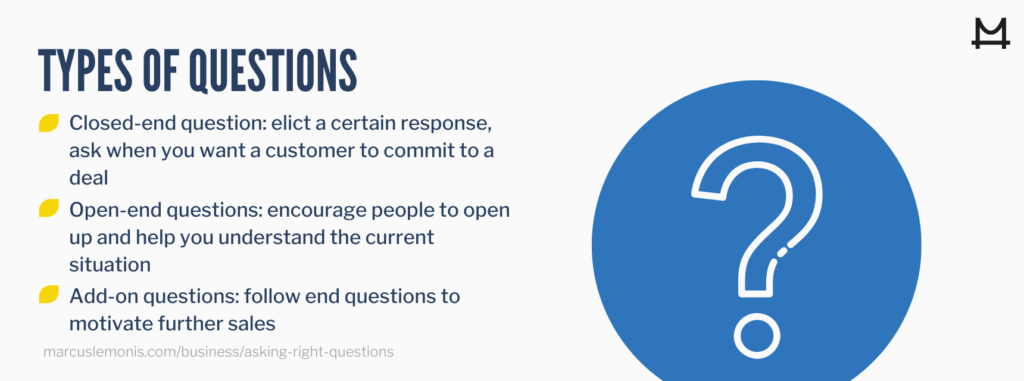
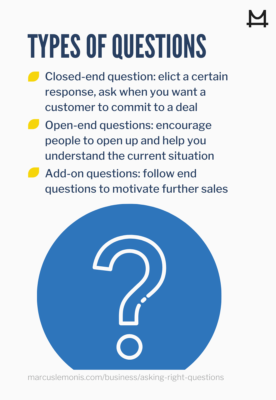
Understand Your Goal
It is vital to have a clear understanding of your business goal before diving into a long list of questions. If you are meeting someone at a networking event, for example, you might only have time for two questions: “Can you tell me about your job?” and “Could I get your contact information?” That sets the stage for a potential follow-up conversation later on.

On the other hand, you could be meeting with the CEO of a major company to discuss a big-ticket B2B deal for your business. If you have a full hour, you should prepare several open-ended questions in advance, but be prepared to deviate from your script, depending on the conversation. You would also want to leave time to answer the CEO’s questions, and either try to close the deal on the spot or ask questions to determine the next step.
The process of asking the right questions has been compared to an upside-down triangle, where you ask the broadest and most general questions at the start. Then, you can gradually narrow things down as you gain a better understanding of the situation. In a sales call, for instance, you might ask dozens of open-ended questions before finally asking for the close.
Starting The Conversation
Whether talking with a prospective customer, interviewing a job candidate or sitting down with an investor, it’s a good idea to start with some friendly questions to get the conversation started. After the initial pleasantries, you should begin with open-ended questions that accomplish two purposes: gathering the information you need and establishing rapport with the other person.
In this situation, asking the right questions involves listening to the person’s initial responses and deciding whether or not to ask follow-up or clarifying questions. For example, a prospect might say, “We want to add a new line to our online store and are considering your brand.” Two good follow-up questions would be, “What sales goals do you hope to achieve with your new line?” and “Why are you considering us?” The responses to those questions can provide an indication of how seriously the prospect is looking to make a deal with you. It can also provide a warning sign, such as a need to address unrealistic expectations later in the discussion.
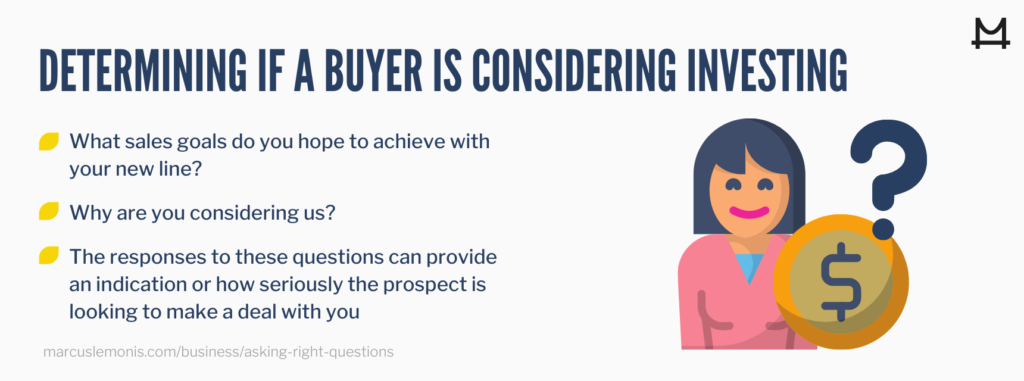
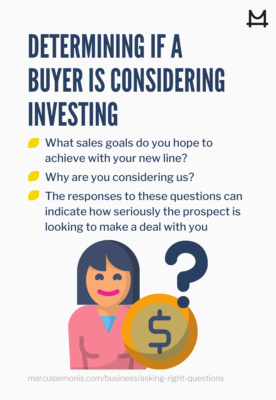
Avoiding Mistakes
In most situations, it would be a mistake to jump directly from the prospect’s initial expression of interest into a long sales pitch about your products’ features and benefits. That’s because you don’t yet have enough information to know why the prospect is interested in your company. You might go off on a tangent or emphasize a feature that’s not very important to the potential customer. By jumping into your sales pitch too soon, you can turn off prospects who feel that you don’t really care about their needs.
Another common mistake is asking questions that put the other person on the defensive. For example, “Why should I invest in your business when it’s doing poorly under your leadership?” or “Why do you treat your employees negatively?” These types of open-ended questions can make the other person feel trapped and are unlikely to lead to a positive outcome.
You should also try to stay on track during the conversation. If you become distracted, you might ask several questions that don’t bring you any closer to your goal. Once past the opening phase, you should avoid rhetorical questions like, “Aren’t we having great weather today?” when both you and the other person already know the answer.
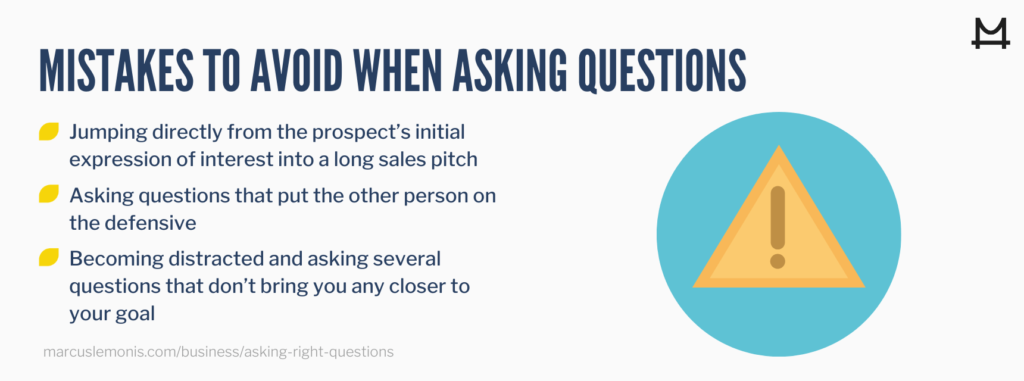
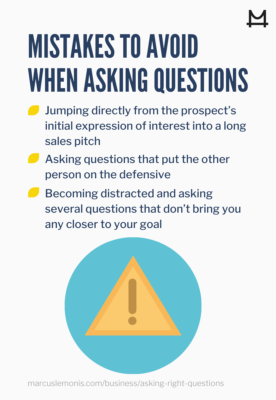
Active Listening
One of the most valuable skills for any business owner is learning how to be an active listener. That means paying more attention to the other person’s responses than to your own questions. You might find yourself taking notes or nodding your head. Another excellent technique is to repeat the other person’s words, such as, “You said that your current supplier just raised prices by 25 percent and you are looking for a new vendor. Is that correct?”
This is an example of how active listening can keep you asking the right questions by following up on the other person’s prior comments.

You should also pay attention to the other person’s body language and non-verbal cues. If a prospect looks at her watch, it’s time to move the conversation along. Perhaps you’re asking too many open-ended questions without getting to the point of the discussion.
As you practice active listening, don’t be afraid to allow a pause in the conversation. There’s an old saying that “silence is golden.” The other person might need a few moments to collect his or her thoughts, so don’t rush the process. Perhaps you’ve just asked if the prospect is ready to close the deal or invest in your business. The last thing you want to do is restart the conversation until you hear the response!
Finally, be sure to express your gratitude. After a session of questions and answers, it’s appropriate to say, “Thank you for your time and interest.” That provides a natural segue to a question about the next step in the process, such as, “I will check with my team and send you a detailed proposal next week. Would that timing be okay?” Again, your goal is to keep things moving forward, even after the conversation is over.
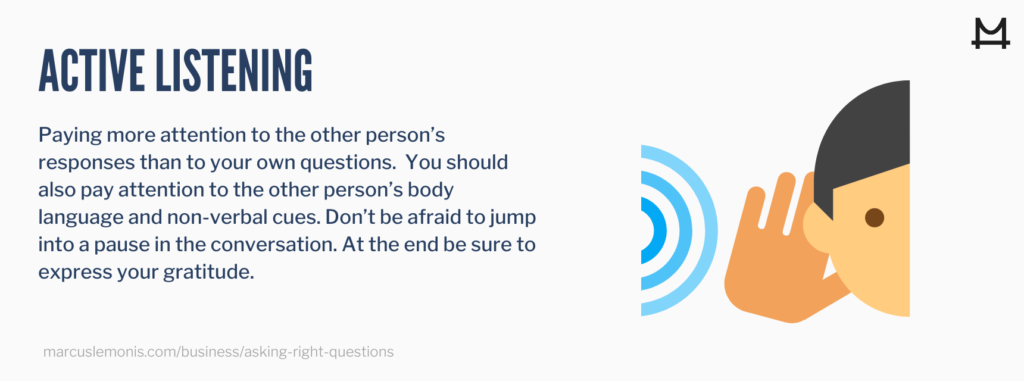
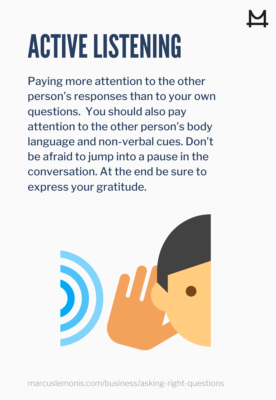
Building Relationships
Whenever you are discussing a possible transaction – sales, employment, partnership or investment – remember that asking the right questions can do more than simply close the deal. Knowing how to approach the conversation, becoming an active listener and avoiding common mistakes can also help you lay the foundation for a longer-term relationship in the future. As Marcus says, “The key to business isn’t being smarter or wealthier, it’s being able to connect to people and relate to them.”
- What are some questions you would ask?
- What new tool are you adding after reading this?





